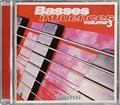 History of Jazz is milestoned by great bass players, skilled experts, living legends, quiet, eccentric, easy going or ascetic, often worshipped, sometimes feared, always close to their music partners. Bass players are strange musicians, lonely and reliable, solid and changeable as well, deep and light, working hardly in shadow, talking few as if words were something excessive. Stephane Bertrand is that kind of guy. His first album "Esmak" came up without warning, black and lightful, stuffed with climatic discoveries and cool moods. Second opus "Clandestin" then confirmed this revelation, white and tragic, spotted with graceful sparks and striking poetry. With this third album, Stephane Bertrand keeps on dispatching surprises, sharing with us an adventure where he has been able to deal with all risks. Tied melodies and iron rhythmics, gurgling dialogs behind a voluble trombone, mix up of jungle scansions and crooky hammerings, acoustic rubbings and electronic coatings, friendship exchanges and cross strings... Where some just make simple tries, Stephane Bertrand rather succumbs to his own temptations, willing to open himself to world motion, far from today's touting fashions and without abjuring his first adhesions. This album is rare because it succeeds in expressing strongly contrasted climates without looking demonstrative, because it hides its own complexity under a humble attitude. Subtlety projected into great art, just because making simple is never simple. Stephane Bertrand achieves this tough and brilliant task that consists in unveiling at end all that palpitates behind appearances.
History of Jazz is milestoned by great bass players, skilled experts, living legends, quiet, eccentric, easy going or ascetic, often worshipped, sometimes feared, always close to their music partners. Bass players are strange musicians, lonely and reliable, solid and changeable as well, deep and light, working hardly in shadow, talking few as if words were something excessive. Stephane Bertrand is that kind of guy. His first album "Esmak" came up without warning, black and lightful, stuffed with climatic discoveries and cool moods. Second opus "Clandestin" then confirmed this revelation, white and tragic, spotted with graceful sparks and striking poetry. With this third album, Stephane Bertrand keeps on dispatching surprises, sharing with us an adventure where he has been able to deal with all risks. Tied melodies and iron rhythmics, gurgling dialogs behind a voluble trombone, mix up of jungle scansions and crooky hammerings, acoustic rubbings and electronic coatings, friendship exchanges and cross strings... Where some just make simple tries, Stephane Bertrand rather succumbs to his own temptations, willing to open himself to world motion, far from today's touting fashions and without abjuring his first adhesions. This album is rare because it succeeds in expressing strongly contrasted climates without looking demonstrative, because it hides its own complexity under a humble attitude. Subtlety projected into great art, just because making simple is never simple. Stephane Bertrand achieves this tough and brilliant task that consists in unveiling at end all that palpitates behind appearances.Noël Balen







